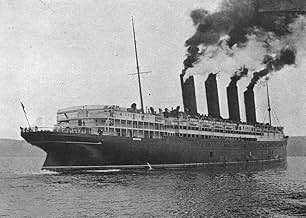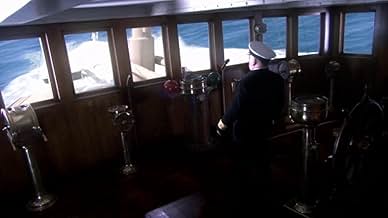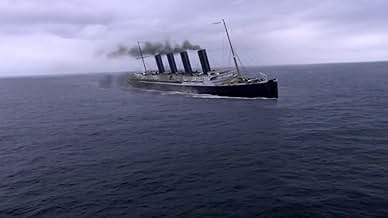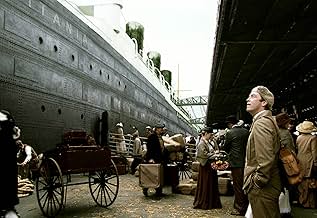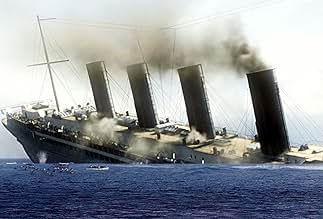Lusitania: Murder on the Atlantic
- Film per la TV
- 2007
- 1h 30min
VALUTAZIONE IMDb
6,9/10
660
LA TUA VALUTAZIONE
Aggiungi una trama nella tua linguaA dramatization of the notorious World War I torpedoing of the ocean liner, RMS Lusitania.A dramatization of the notorious World War I torpedoing of the ocean liner, RMS Lusitania.A dramatization of the notorious World War I torpedoing of the ocean liner, RMS Lusitania.
Florian Panzner
- Lt. Capt. Schwieger
- (as Florian Panzer)
Madeleine Garrood
- Avis Dolphin
- (as Maddeleine Garrood)
Andre Weideman
- Johnston
- (as Andre Weiderman)
Stephen Jennings
- Carson
- (as Steven Jennings)
Robyn LeAnn Scott
- Peggy
- (as Robyn Scott)
Trama
Lo sapevi?
- QuizThe U-20 set was the original U-96 set used in U-Boot 96 (1981). The Type U-19 of World War I and Type VIIC of World War II had similar internal dimensions.
- BlooperOn at least two occasions the captain of the U 20 gives the order to "blow ballast" when he wants to dive the submarine. This order would result in all water being blown out of the ballast tanks and should only be given to surface the boat. In order to dive a submarine one must flood the ballast tanks with water.
- Citazioni
Captain Turner: They're not interested in the truth.
- Curiosità sui creditiAdrian Topol's character name is pronounced Voegele in the German dialogue and is spelled this way in the accompanying English subtitles. However in the credits it is spelled Vogele. Correct German spelling uses either "ö" (o with an umlaut) or else "oe".
- ConnessioniFeatured in Titanic al detalle (2013)
Recensione in evidenza
I saw the docudrama today, thanks to Youtube, and can't support the criticism of the two other reviews here at all. Imho this BBC movie is a very good effort at educating the public about this crucial episode of history, regarding the constraints of the budget and the running time of the movie.
As a German citizen, I am, of course, not a totally impartial party (even though I try hard to be), but neither are British nor American commenters. However, I have read one of the most comprehensively sourced books on the subject, Colin Simpson's "The Lusitania", as well as countless in formations on the Internet and I'm basing my judgment on the facts that historians agree on, something that is lacking from both other reviews. And, as I see it, this BBC film got the most important facts right, while at the same time offering great acting and a storyline that shows the human side of the tragedy.
To the facts: - The Lusitania transported ammunition for the British war efforts, and this has been proved with documentary evidence. The movie mentions the fact, without going into the length of telling us that not only British officials knew this, but also US ones, as well as the German intelligence service. Since the complex US and German subplot would have taken a lot of time to tell (and introduce a lot of additional players), it is understandable that the movie leaves this side out. However, personally, I would have liked that a least a mention of the overwhelmingly pro-British tendency of the Wilson administration (especially the role of Col. House) would have been made, but it may have made the storyline too confusing.
Only the most important facts, and imho they are covered in a fair and still entertaining way by the movie. It would have been impossible to show every detail in a 90 minute feature, but the viewers get a good summary, which stay close to the view of the historians. And there isn't an especially pro-German bias (hey, it's a BBC production!). The hypocritical stance of the German Kaiser and his Admirals, who didn't want to be remembered of their own orders after public opinion turned against them is exposed, and German sub captain Schwieger is shown as a somewhat weak character, drawn between ambition, orders, and what may still have been left of ethical values. If there's any bias at all it's pro-American, because US officials, who put their countrymen into danger by deliberately ignoring the illegal transport of war supplies on a British passenger ship, aren't given any scrutiny at all. But, OK, this sideline would have taken another 20 minutes or so to tell.
So, all in all, a very good docudrama combining historical facts with good storytelling an cinematographic values. The special effects, the appearance of the Lusitania and the sub, don't look too cheap (which is often the problem with docudramas), also the use of historical coverage is accomplished in a convincing way. Taking also in consideration the good acting, especially the performances of John Hannah ("Four Weddings And A Funeral") and Adrian Topol, this movie deserves 8-9 out of 10 points. Job well done, BBC!
As a German citizen, I am, of course, not a totally impartial party (even though I try hard to be), but neither are British nor American commenters. However, I have read one of the most comprehensively sourced books on the subject, Colin Simpson's "The Lusitania", as well as countless in formations on the Internet and I'm basing my judgment on the facts that historians agree on, something that is lacking from both other reviews. And, as I see it, this BBC film got the most important facts right, while at the same time offering great acting and a storyline that shows the human side of the tragedy.
To the facts: - The Lusitania transported ammunition for the British war efforts, and this has been proved with documentary evidence. The movie mentions the fact, without going into the length of telling us that not only British officials knew this, but also US ones, as well as the German intelligence service. Since the complex US and German subplot would have taken a lot of time to tell (and introduce a lot of additional players), it is understandable that the movie leaves this side out. However, personally, I would have liked that a least a mention of the overwhelmingly pro-British tendency of the Wilson administration (especially the role of Col. House) would have been made, but it may have made the storyline too confusing.
- Not only ammunition, but also military personnel on the way to the war zone was transported. The movie doesn't show this, probably because it would have necessitated to introduce additional characters.
- As the movie mentions, the Lusitania was indeed on the list of British auxiliary cruisers. What the filmmakers doesn't tell us is that even basements for naval guns had been installed on the Lusitania after the war. Among passengers and staff, there were even rumours and that the guns were already hidden on the ship. Also mentioned by the BBC, contrary to agreed rules of naval warfare, Admiralty had issued orders to the merchant marine calling for deliberately ramming of submarines.
- It's a fact that British officials deliberately asked how the US would react if American citizen would be killed on a British ship. This is shown in the movie, even though it is left to the judgment of the viewers if and how this influenced the Admiralty in their decisions. The movie just shows the known facts, without taking a clear stance, which is a good idea regarding the lack of decisive evidence.
- The Germans had declared the waters an unrestricted war zone, and really warned passengers in the newspapers. The Lusitania, as a well known British ship, was in imminent danger, while at the same time neutrals, like American vessels, would have been relatively safe. Like the movie showed, it was dangerous ignorance in combination with misguided believe in the Admiralty safety promises that led many passengers to ignore the grave risk.
- The movie shows only one torpedo being fired. This is in accordance with German documents and testimonies, and the established view of historians worldwide. There has never been compelling evidence that more torpedoes were fired. The question, why the Lusitania sank so fast has never really been answered, the most recent view being that both the specific construction of the Ship (longitudinal bulkheads!) and an explosion of a boiler played a role. The movie doesn't show how the second explosion happened and so stays neutral on this question. Imho a good idea, because this isn't essential to the story.
- The Admiralty really did take an unfair stance in the court case, as depicted in the movie. Also, the order for the so called "advised course" contradicted other standing orders, as well as the necessities of navigation. And many important information were never relayed to the Lusitania. What isn't shown is that the Admiralty even presented doctored wireless logs, and that the judge noticed that. Maybe it would have been good to include this in the story, since it adds to the understanding of the administration-critical stance of the Judge, and of the consequent verdict.
Only the most important facts, and imho they are covered in a fair and still entertaining way by the movie. It would have been impossible to show every detail in a 90 minute feature, but the viewers get a good summary, which stay close to the view of the historians. And there isn't an especially pro-German bias (hey, it's a BBC production!). The hypocritical stance of the German Kaiser and his Admirals, who didn't want to be remembered of their own orders after public opinion turned against them is exposed, and German sub captain Schwieger is shown as a somewhat weak character, drawn between ambition, orders, and what may still have been left of ethical values. If there's any bias at all it's pro-American, because US officials, who put their countrymen into danger by deliberately ignoring the illegal transport of war supplies on a British passenger ship, aren't given any scrutiny at all. But, OK, this sideline would have taken another 20 minutes or so to tell.
So, all in all, a very good docudrama combining historical facts with good storytelling an cinematographic values. The special effects, the appearance of the Lusitania and the sub, don't look too cheap (which is often the problem with docudramas), also the use of historical coverage is accomplished in a convincing way. Taking also in consideration the good acting, especially the performances of John Hannah ("Four Weddings And A Funeral") and Adrian Topol, this movie deserves 8-9 out of 10 points. Job well done, BBC!
I più visti
Accedi per valutare e creare un elenco di titoli salvati per ottenere consigli personalizzati
Dettagli
- Data di uscita
- Paesi di origine
- Lingue
- Celebre anche come
- Sinking of the Lusitania: Terror at Sea
- Aziende produttrici
- Vedi altri crediti dell’azienda su IMDbPro
Contribuisci a questa pagina
Suggerisci una modifica o aggiungi i contenuti mancanti

Divario superiore
By what name was Lusitania: Murder on the Atlantic (2007) officially released in India in English?
Rispondi
